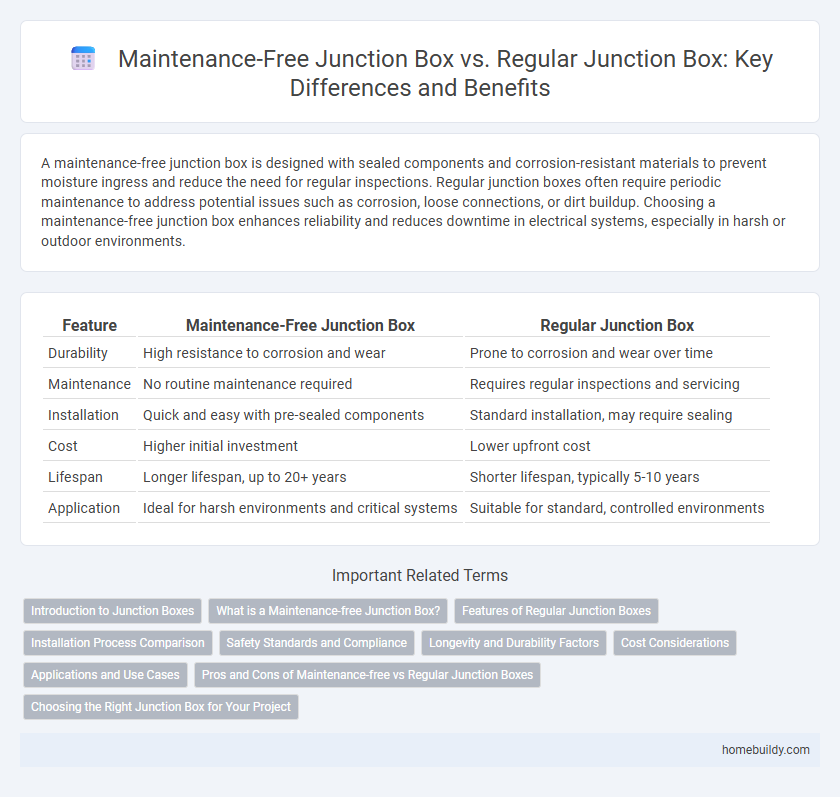A maintenance-free junction box is designed with sealed components and corrosion-resistant materials to prevent moisture ingress and reduce the need for regular inspections. Regular junction boxes often require periodic maintenance to address potential issues such as corrosion, loose connections, or dirt buildup. Choosing a maintenance-free junction box enhances reliability and reduces downtime in electrical systems, especially in harsh or outdoor environments.
Table of Comparison
| Feature | Maintenance-Free Junction Box | Regular Junction Box |
|---|---|---|
| Durability | High resistance to corrosion and wear | Prone to corrosion and wear over time |
| Maintenance | No routine maintenance required | Requires regular inspections and servicing |
| Installation | Quick and easy with pre-sealed components | Standard installation, may require sealing |
| Cost | Higher initial investment | Lower upfront cost |
| Lifespan | Longer lifespan, up to 20+ years | Shorter lifespan, typically 5-10 years |
| Application | Ideal for harsh environments and critical systems | Suitable for standard, controlled environments |
Introduction to Junction Boxes
Maintenance-free junction boxes offer enhanced durability with sealed, corrosion-resistant materials, reducing the need for routine inspections and repairs. Regular junction boxes typically require periodic maintenance to prevent moisture ingress and electrical faults. Selecting a maintenance-free option improves long-term reliability in both indoor and outdoor electrical installations.
What is a Maintenance-free Junction Box?
A maintenance-free junction box is designed with sealed, corrosion-resistant materials and advanced insulation to eliminate the need for regular upkeep in electrical connections. Unlike regular junction boxes, which require periodic inspection, cleaning, and tightening of connections, maintenance-free types use durable components that ensure long-term reliability and protection against environmental factors such as moisture and dust. These junction boxes are ideal for installations in harsh or remote environments where minimizing maintenance efforts is crucial.
Features of Regular Junction Boxes
Regular junction boxes typically feature metal or plastic enclosures designed to protect wiring connections from environmental factors such as moisture and dust. They require periodic inspection and maintenance to prevent corrosion, ensure tight connections, and avoid electrical faults. These boxes often have removable covers and use screw terminals, making them accessible but necessitating routine upkeep for optimal performance.
Installation Process Comparison
Maintenance-free junction boxes simplify the installation process by eliminating the need for periodic inspections or resealing, significantly reducing labor time and costs compared to regular junction boxes. These boxes often feature pre-sealed, durable materials and integrated connectors that streamline wiring and minimize environmental exposure risks. In contrast, regular junction boxes require meticulous sealing and frequent maintenance checks to prevent moisture ingress and corrosion, extending installation and upkeep efforts.
Safety Standards and Compliance
Maintenance-free junction boxes are engineered to meet higher safety standards such as IP66 and UL94 V-0, ensuring superior protection against dust, water ingress, and fire hazards compared to regular junction boxes. These boxes comply with stringent international certifications including IEC 60529 and NFPA, minimizing risks associated with electrical failures and enhancing operational safety in harsh environments. Regular junction boxes often require periodic maintenance and inspections to uphold safety compliance, whereas maintenance-free options reduce the need for intervention while maintaining consistent adherence to electrical safety regulations.
Longevity and Durability Factors
Maintenance-free junction boxes offer enhanced longevity and durability due to their corrosion-resistant materials and sealed designs that prevent moisture and dust ingress. Regular junction boxes, often made with standard metal or plastic enclosures, are more susceptible to environmental wear, leading to increased maintenance and shorter operational life. Choosing maintenance-free options reduces the risk of electrical failures and extends service intervals in harsh or outdoor conditions.
Cost Considerations
Maintenance-free junction boxes typically have higher upfront costs due to advanced sealing technologies and durable materials designed to eliminate regular maintenance expenses. Regular junction boxes require lower initial investment but incur ongoing maintenance, inspection, and potential repair costs, which can increase total expenditure over time. Evaluating lifecycle expenses reveals maintenance-free models may offer better long-term value despite the initial premium.
Applications and Use Cases
Maintenance-free junction boxes are ideal for harsh environments such as outdoor installations, industrial plants, and marine settings where corrosion resistance and minimal upkeep are critical. Regular junction boxes suit indoor applications with controlled conditions, offering cost-effective protection for electrical connections in residential and commercial buildings. Choosing the right junction box depends on exposure risks, maintenance capabilities, and the specific demands of the electrical system.
Pros and Cons of Maintenance-free vs Regular Junction Boxes
Maintenance-free junction boxes eliminate the need for regular inspections and tightening of connections, reducing downtime and labor costs, while providing enhanced resistance to corrosion and environmental factors. Regular junction boxes often require periodic maintenance to ensure reliability, posing risks of connection failures and increased operational costs, but they typically offer easier access for troubleshooting and repairs. Choosing between the two depends on factors such as installation environment, budget constraints, and long-term reliability requirements.
Choosing the Right Junction Box for Your Project
Maintenance-free junction boxes offer enhanced durability, corrosion resistance, and simplified installation, making them ideal for long-term projects in harsh environments. Regular junction boxes may require periodic inspection and upkeep, increasing operational costs and downtime. Selecting the right junction box depends on project requirements, environmental conditions, and budget constraints to ensure optimal performance and safety.
Maintenance-free junction box vs Regular junction box Infographic

 homebuildy.com
homebuildy.com